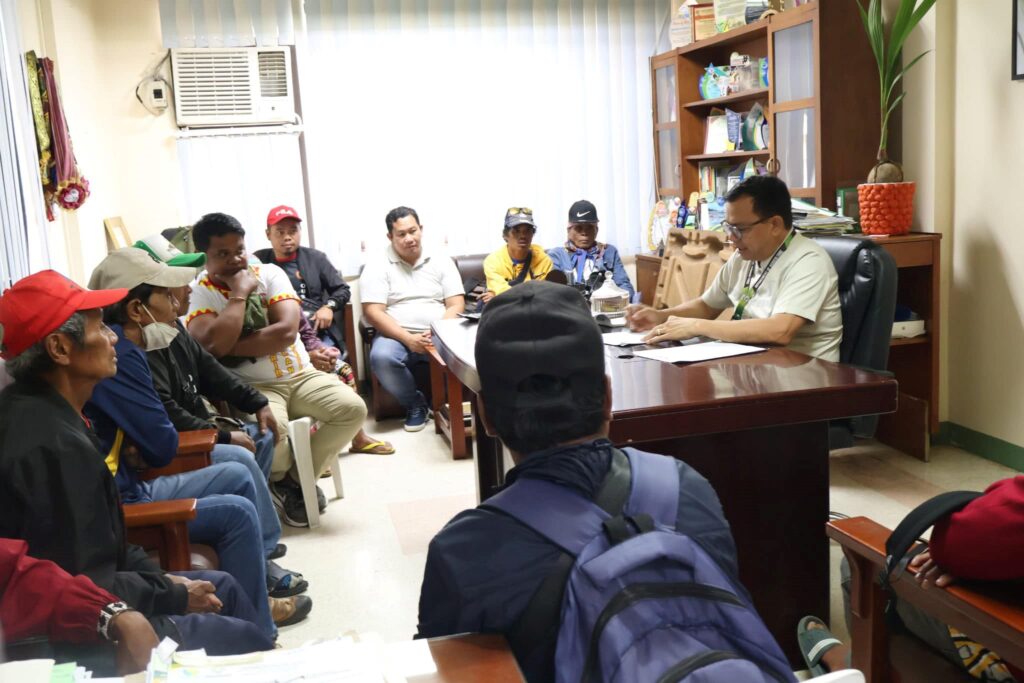Bukidnon ups coffee game with farmer training

CAGAYAN DE ORO CITY (July 18, 2025, 3:32 a.m.) – Bukidnon province has kicked off a comprehensive training program for 30 farmer-leaders and nursery operators, a key step in its ambitious coffee roadmap Governor Rogelio Neil Roque announced Thursday that the Provincial Agricultural Office is spearheading efforts to unite coffee farmers and groups, aiming to […]
DOST revives traditional IP weaving in Bukidnon

CAGAYAN DE ORO CITY (February 26, 2025, 9:11 p.m.) – The Department of Science and Technology (DOST) in Region 10 has partnered with the local government of Talakag, Bukidnon province, to revive the traditional weaving practices of indigenous peoples (IPs) In a statement Wednesday, DOST-10 Chief Science Research Specialist Virgilio Fuertes said the initiative is […]
Bukidnon hits 1.4M PhilSys registrants, drives civil records up

MALAYBALAY CITY (PIA) – Civil registration in Bukidnon surged as the province reached 1.4 million Philippine Identification System (PhilSys) registrants, underscoring the key role of civil registration and demographic data in planning for health, education, and social welfare, according to Ma. Evangeline Non, chief of the Philippine Statistics Authority (PSA)-Bukidnon She reported that of the […]
2 pilots found dead inside FA-50 fighter jet in Bukidnon mountain

MANILA, Philippines (12:32 PM March 05, 2025) — The remains of two pilots aboard a missing FA-50 fighter jet were found on Wednesday inside the aircraft, which crashed in the Kalatungan mountain range in the Bukidnon province In an interview, Lt. Gen. Luis Rex Bergante, commander of the Armed Forces of the Philippines (AFP) Eastern […]
PhilHealth to expand services to Bukidnon IPs

CAGAYAN DE ORO CITY (February 11, 2025, 9:42 pm) – The Philippine Health Insurance Corp. (PhilHealth) is working to expand its coverage to indigenous peoples (IPs) in Bukidnon province PhilHealth Bukidnon local health insurance chief Romulo Lapuz Jr. said on Tuesday that one of the agency’s goals is to provide free health insurance to the […]
Interfaith prayer rally alang sa Demokrasya ug Kontra Korapsyon gipahigayon

Kaniadtong hapon sa Enero 26, 2025, gipahigayon ang province-wide Interfaith Prayer Rally nga gi-organisar sa Barug Maisug Bukidnon – Kontra Korapsyon, Duterte for Democracy (BMBKKDD) Ang kalihokan nagsugod sa usa ka motorcade gikan sa PCC Covered Court ngadto sa Maramag Integrated Bus Terminal, diin ang mga partisipante naghiusa sa usa ka kusganong pagpahayag batok sa […]
Army installs new 4ID commander, pledges peacebuilding efforts

CAGAYAN DE ORO CITY (January 28, 2025, 7:21 pm) – The Philippine Army on Tuesday installed Brig. Gen. Michele Anayron Jr. as the new commander of the 4th Infantry Division (4ID), overseeing parts of Northern Mindanao and the Caraga region In his inaugural speech, Anayron emphasized his commitment to advancing peace and development in collaboration […]
COMELEC Prepares for 2025 Elections, Issues Voter Guidelines

MISAMIS ORIENTAL – The Commission on Elections (COMELEC) announced that the number of registered voters in Northern Mindanao has surpassed 3 million, covering the provinces of Bukidnon, Lanao del Norte, Misamis Occidental, Misamis Oriental, and Camiguin. Misamis Oriental leads with over 1 million voters Atty. Carlito Ravelo, Misamis Oriental’s Provincial Election Supervisor, highlighted that Region […]
Agri-10 4K Boosts Production, Livestock Support for IPs

MALAYBALAY CITY, Bukidnon — The Department of Agriculture – Northern Mindanao (DA-10) is enhancing its support for indigenous peoples (IPs) in Bukidnon province through various agricultural programs and services On January 9, under its Kabuhayan at Kaunlaran para sa Kababayang Katutubo (4K) program, the agency turned over PhP480,000 worth of carabaos to IP groups in […]
NPA combatant killed in Bukidnon

MALAYBALAY CITY, Bukidnon – An alleged New People’s Army (NPA) combatant was killed during an encounter with 8th Infantry Battalion personnel in the hinterland of Sitio Bendum, Brgy. Busdi, Malaybalay City, Bukidnon on August 19, 2024 In a statement, the military identified him as Norbet Sarinao Lipanda @Omar, squad leader of Squad 2, Headquarters Force […]
